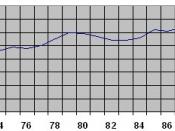Youth Criminal Justice Act: An Era of Social Reform
In 1984 the Young Offenders Act (YOA) was established, it replaced the Juvenile Delinquents Act (JDA) of 1908 and its core objective was to guarantee that the rights and freedoms of Canadian youth were being satisfied. With the passing of the YOA also came extreme revisions and numerous opportunities for Canada's young offenders. The YOA provided youth with extended rights, an abundant number of opportunities for rehabilitation, as well as therapy-oriented associations and institutions. The act offers exclusive conditions that apply to all Canadian youth. Furthermore the YOA takes into consideration such aspects as age, maturity, sensibleness, and seriousness of the crimes committed. The YOA defines a "child" as, " A person who is or, in the absence of evidence to the contrary, appears to be under the age of twelve years" . Comparably, the act defines a "young person" as:
A person who is or, in the absences of evidence to the contrary, appears to be twelve years of age or more, but under eighteen years of age and, where the context requires, includes any person who is charged under this act with having committed an offence while he was a young person or is found guilty of an offence under this Act .
The act has catered positively to children and young people throughout Canada for almost twenty years now, however some weaknesses have become evident since the act was passed. There are a small number of programs for female youth offenders, the use of custody dispositions for less violent crimes has been exhausted, alternative options are too infrequently used, and youth from aboriginal descent are over represented. Anne McLellan is Canada's minister of Justice and Attorney General of Canada, and it was her who pioneered the...



Youth Criminal Justice Act
This essay is very informative and researched. I would check a couple of the dates such as YCJA was passed in 2002, and brought into action in 2003. Otherwise, I loved reading it and it helped alot with my essay.
1 out of 1 people found this comment useful.